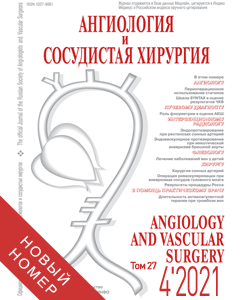Journal «Angiology and Vascular Surgery» •
2018 • VOLUME 24 • №4
Transcutaneous coronary intervention with the use of extracorporeal membrane oxygenation in patients with acute coronary syndrome
Vereshchagin I.E., Ganyukov V.I., Tarasov R.S., Kochergin N.A., Shukevich D.L., Barbarash O.L.
Research Institute for Complex Problems of Cardiovascular Diseases, Kemerovo, Russia
Analysed herein are the in-hospital and remote (12 months) results of transcutaneous coronary interventions (TCI) carried out in patients with non-ST elevation acute coronary syndrome (nSTE-ACS) and multivessel coronary artery disease with the use of extracorporeal membrane oxygenation (ECMO).
From 2013 to 2015, the study included a total of 18 patients with nSTE-ACS and multivessel coronary artery disease who had been denied "open" surgical myocardial revascularization. The mean values (scores) of the scales in the group were as follows: GRACE – 119.7±67.6, SYNTAX Score – 33.5±8.1, Euroscore II – 5.2±21.9. The ejection fraction was averagely moderately low – 49.3±19.4%.
During the in-hospital stay of the patients and 12 months after TCI we assessed the major adverse cardiovascular events (MACE): death, myocardial infarction, acute cerebral circulation impairment/transitory ischaemic attack, repeat revascularization of the target vessel – both as separate parameters and in a composite form. Additionally, we analysed perioperative and in-hospital complications, their structure, the volume of replacement therapy with blood components and the length of hospital stay.
During the in-hospital period and at 12 months of follow up, the composite number of cases of adverse cardiovascular events amounted to 1 (5.5%) and 3 (16.5%), respectively. One patient died during in-hospital treatment and one more lethal outcome was registered by 12 months of follow up; hence, the mortality rate amounted to 1 (5.5%) and 2 (11%) cases, respectively. Stroke was observed in 1 (5.5%) patient only during the in-hospital period. No repeat revascularisation of the target vessel was performed. By the end of the hospital stay, BARC type 3-5 haemorrhagic complications were observed in 50% of patients.
The in-hospital and remote (12 months) results of high-risk TCI with ECMO support in patients with nSTE-ACS and multivessel coronary artery disease, who had been denied surgical revascularization demonstrated an acceptable level of unfavourable outcomes. This approach may be regarded as a method alternative to revascularization and used in an utterly severe cohort of patients.
KEY WORDS: non-ST elevation acute coronary syndrome, transcutaneous coronary intervention, extracorporeal membrane oxygenation, multivessel coronary artery disease.
P. 157
ARCHIVES MAGAZINE
2021 (Vol.27)
2020 (Vol.26)
2019 (Vol.25)
2018 (Vol.24)
2017 (Vol.23)
2016 (Vol.22)
2015 (Vol.21)
2014 (Vol.20)
2013 (Vol.19)
2012 (Vol.18)
2011 (Vol.17)
2010 (Vol.16)
2009 (Vol.15)
2008 (Vol.14)
2007 (Vol.13)
2006 (Vol.12)
2005 (Vol.11)
2004 (Vol.10)
2001 (Vol.7)
2000 (Vol.6)
1999 (Vol.5)
1998 (Vol.4)
1997 (Vol.3)


